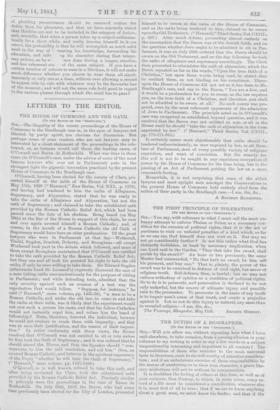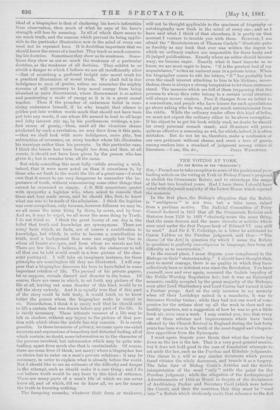THE DUTIES OF A BIOGRAPHER.
(To THH EDITOR OF TIM SFROTATOR.1 Sin,—Will you allow me, without repeating here what I have said elsewhere, to take occasion, from a passing allusion in your columns to my writing in order to say a few words ou a subject unquestionably interesting and important to all readers P The responsibilities of those who minister to the most universal taste in literature, seem to me well worthy of attentive considera- tion; and if an unfortunate exercise of these responsibilities be the means of awakening us to their true character, a grave lite- rary misfortune will not be without its compensation.
It is doubtless the feeling of others at this time, as well as of your reviewer, that History, to which, in some sense, every re- cord of a life must be considered a contribution, whatever else it is, must first of all be true ; that if we are to know anything about a great man, we must know his faults ; and that if the
ideal of a biographer is that of sheltering his hero's infirmities from observation, then much of what he says of his hero's strength will lose its meaning. In all of which there seems to me much truth, and the reasons which prevent its being applic- able to the particular illustration now in the mind of every one need not be repeated here. It is doubtless important that we should know the errors of a teacher. They teach us much concern- ing his doctrine. Sometimes they show us its weakness. Some- times they show us not so much the weakness of a particular doctrine, as the weakness of all doctrine. They exhibit to us afresh a danger to which I believe we are all insufficiently alive —that of mistaking a profound insight into moral truth for a practical illustration of moral truth. Wo shall fail in due indulgence to men of genius, unless we remember the mighty exercise of will necessary to keep moral energy from being absorbed in mere discernment, where discernment is so active and penetrating a mode of energy as it is in a great moral teacher. Thus if the preacher of endurance failed in exer- cising endurance himself, if he who taught that silence is golden put into written words much that should not have been put into any words, if one whose life seemed to lead to all large and lofty interest stir up, by his posthumous writings, a per- fect storm of gossip,—then, amid all the vicarious shame awakened by such a revelation, we may draw from it this gain, —that we shall look with more indulgence, more pity, less subtraction of reverence, on every teacher whore life illustrates his warnings rather than his precepts. In this particular case, I think the lesson has been bought too dear, and that, at all events, it should not have been given by the person who has given it ; but it remains true, all the same.
But while conceding this most fully—while avowing a wish, indeed, that it were more acted on than it sometimes is, by those who set forth to the world the life of a great man—I must own that it seems to me very dangerous to remember the im- portance of truth, without remembering some other things that cannot be expressed so simply. J. S. Mill somewhere quotes with sympathy a logician who, when asked to concede that three and four made seven, said he should like, first, to know what use was to be made of the admission. I think the logician was over•sernpnlous, only because, however different we may be, we all mean the same thing by three, by seven, and by four. And so, it may be urged, we all mean the same thing by Truth. I do not think so. 1 think the great heresy of our day is the belief that truth and knowledge are synonymous. There are rnauy facts which, as facts, are of course a contribution to knowledge, but which, in order to become a contribution to truth, need a background that none can supply but One to whom all hearts are open, and from whom no secrets are hid. There are few • lives, I believe, in which the endeavour to tell all that can be told would result in a true picture of the char- acter portrayed. I will take an imaginary instance, for these principles are meaningless till they are illustrated. I will sup- pose that a biographer discovers his hero to have failed in some important relation of life. The perusal of his private papers, lot us suppose, reveals discord and disaster iu the home. Of course, there are cases in which, to set forth any picture of the life at all, leaving out some disaster of this kind, would be to tell the story untruly. And it is equally true that if this part of the story could be told truly, it would teach us to know better the person whom the biographer seeks to reveal to us. Nevertheless, I think it is rarely well that he should seek to lift a curtain that was drawn before any part of the life. It is rarely necessary. These intimate recesses of a life may be left in shadow, without any injury to the picture of that por- tion with which alone the public has any concern. It is rarely possible. In these invasions of privacy, we come upon one-sided accounts and expressions of transitory and distorted feeling, all of which contain, no doubt, some information as to the character of the persons involved, but information which may be quite mis- leading, apart from much else that is unattainable. Of course, there arc some lives (I think, not many) where a biographer has no choice but to enter on a man's private relations ; it may be necessary, in order to explain what is already before the world.
But I should like to see an estimate of the difficulty and danger in the attempt, such as should make it a rare thing ; and I do not believe truth would be any loser by this kind of reticence.
There are many parts of a man's life of which we can never know all, and of which, till we do know all, we are far nearer the truth in knowing nothing.
The foregoing remarks, whatever their force or weakness,
will not be thought applicable to the specimen of biography or- autobiography now fresh in the mind of every one ; and as I have said what I think of that elsewhere, it is partly on that account I venture to trouble you with them. However, I am- afraid the " Reminiscences of Thomas Carlyle" illustrate quite as forcibly as any book that ever was written the degree to • which we ordinary readers are responsible for these hasty and ill-judged publications. Exactly where an editor should become wary, we become eager. Exactly what it least imports us to know, we are most eager to learn. "Z is the greatest fool of my acquaintance," writes an eminent man in a private letter. When his biographer comes to edit his letters, " Z " has probably lost even the small interest attaching to him in his lifetime; never- theless, there is always a strong temptation to let these sentences stand. The memoirs which aro full of them (supposing that the persons to whom they refer belong to a certain social stratum). will always secure readers. Poor Z changes from an initial to a conundrum, and people who have leisure for such speculations go about asking who he was, and get much entertainment from the riddle. While the ordinary reader offers this kind of bribe, we must not expect the ordinary editor to be above corruption.. If his object be to get his book widely read, no doubt he should let every personal remark stand; and ill-nature will prove. quite as effective a seasoning as wit, for which, indeed, it is often mistaken. But do not let us, therefore, make a confession of our own pettiness without shame, and erect a love of gossip, among readers into a standard of judgment among critics of







































 Previous page
Previous page